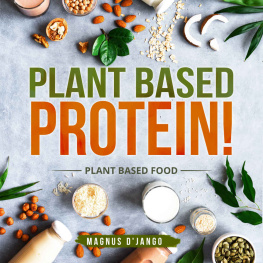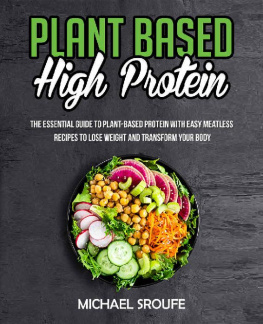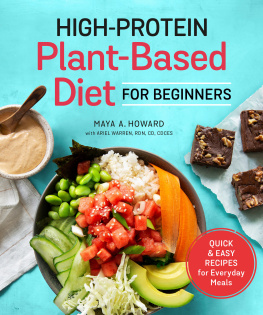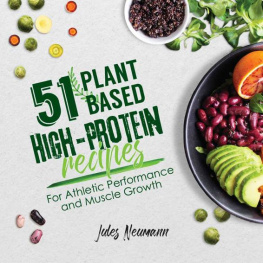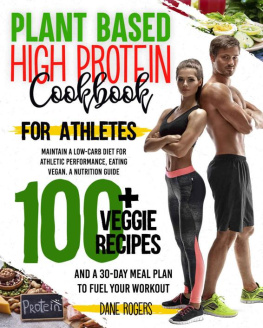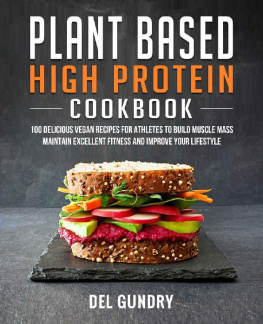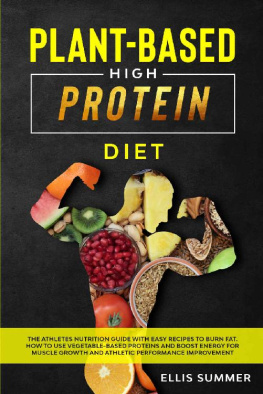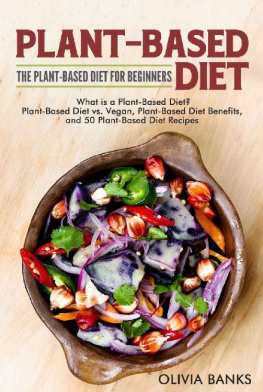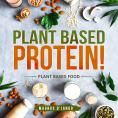Introduction
The key to feeling great and to maintaining a healthy mind and body is very simple and it doesnt mean turning your life upside down, giving up everything you love, or spending your life at the gym. It basically comes from keeping up a plant-based eating routine. That is where this book comes in. Throughout the chapters, we are going to look at plant-based protein and the huge benefits it has for your wellbeing, including exploring vegan diet plans, plant-based meals and food, vegan protein, and plant food, and much more.
The big question is: What does plant-based actually mean? Very simply, it is exactly what it sounds like comes from plants, non-GMO, natural, and usually local. Foods part of this lifestyle include seeds, nuts, fruits, legumes, vegetables, and whole grains. The good news is, plant-based protein is good for you at any age. It supports healthy living throughout each stage of life and has a lot of flexibility, so you can plan your meals around your own nutritional needs.
By the end of these chapters, you will have a greater grounding in plant-based protein, you will know how to plan meals and a diet, and you will feel comfortable with what vegan protein and plant-based foods are. There are so many delicious, nutritious, and affordable options to discover, so lets dive right in and get started.
Chapter 1: Vegan Diet Plan
In this section, we are going to explore the advantages of a vegan diet plan and take a look at how to build one.
Having a vegan diet plan can be beneficial in many ways. For instance, it can help you lose weight while reducing the risk of chronic diseases. Most of all, it is extremely nutritious. Large numbers of people are choosing to adopt the vegan way of eating, including many athletes. Research states that this type of diet can improve the health of your heart, lower your chances of getting type 2 diabetes, and decrease your chances of getting cancer.
One of the main things to remember when choosing a vegan diet plan is the importance of including all the nutrients your body needs that people frequently gain from omnivorous (meaning both plant and animal products) diets. These include protein, vitamin D, vitamin B-12, calcium, zinc, omega-3, iodine, and iron. Sanitarium (2020) says, The power of plant-based diets is linked to the nutrients they provide beyond their important vitamins and minerals. They are a key source of dietary fiber, resistant starch, and potent plant compounds including antioxidants and phytochemicals. The benefits also come from whats missing, with plant-based diets containing less saturated fat and less cholesterol.
Lets take a closer look towards how to build a diet that only includes foods that come from plants and excludes all animal products including eggs, meat, and dairy. We need to think about putting in plenty of seeds, vegetables, beans, nuts, fruits, and legumes. By doing this, we will ensure that we get the vital vitamins, minerals, good fats, and proteins that our bodies need in order to stay healthy and balanced.
Nutrients
First, lets discover what nutrients we need to include, and what all of their individual benefits and functions are:
Protein : Found in grains, nuts, legumes, vegetables, and seeds, proteins are important because they help to support energy levels and growth, repair muscles and tissues, build up strength, and keep our digestion, metabolism, and brains healthy.
Iron : You need iron in your diet as its important for development and growth. Your body uses it to make hemoglobin, which is a protein found in red blood cells. This protein takes oxygen away from your lungs to all parts of your body. Iron also supports the production of several hormones. The good news is that, in a vegan diet, you can find it in dried figs and apricots, fortified cereal, lentils, chickpeas, quinoa, beans, cashew nuts, tofu, raisins, kale, pumpkin seeds, hemp seeds, linseed, and chia seeds.
Vitamin D : Vitamin D is good for you as it helps support against chronic health conditions and cancer, and it is also good for teeth and bones. Vitamin D can be found in mushrooms, fortified soy milk, fortified cereals, almond milk, orange juice, and rice milk. Sunshine is also an important source. The Healthline Editorial Team (2013) says, Vitamin D is sometimes called the sunshine vitamin because its produced in your skin in response to sunlight. Its a fat-soluble vitamin in a family of compounds that includes vitamins D-1, D-2, and D-3...Vitamin D has several important functions. Perhaps the most vital are regulating the absorption of calcium and phosphorus and facilitating normal immune system function. Getting a sufficient amount of vitamin D is important for normal growth and development of bones and teeth, as well as improved resistance against certain diseases.
Vitamin-B12 : Vitamin B12 is a good vitamin because it plays a key role in producing red blood cells. In a vegan diet, you can find sources of vitamin-B12 in yeast and yeast spreads, plant milks, and fortified cereals.
Calcium : Calcium is incredibly important for the health of your bones. You can find it in leafy greens, tofu, and tahini. Newman (2020) says, Calcium is a nutrient that all living organisms need, including humans. It is the most abundant mineral in the body, and it is vital for bone health. Humans need calcium to build and maintain strong bones, and 99% of the bodys calcium is in the bones and teeth. It is also necessary for maintaining healthy communication between the brain and other parts of the body. It plays a role in muscle movement and cardiovascular function...As children grow, calcium contributes to the development of their bones. After a person stops growing, calcium continues to help maintain the bones and slow down bone density loss, which is a natural part of the aging process.

